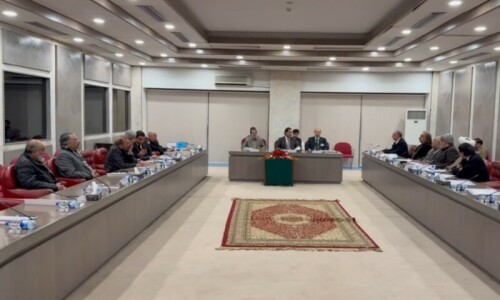AIRLINES do not care who owns and operates airports; it is the cost, service and safety standards that matter to them. This, in fact, is the bottom line of our new aviation policy, expected to be finalised soon possibly before Eid-ul-Azha.
According to Captain Shujaat Azeem, special assistant to the prime minister on aviation, the government’s priority is to upgrade the 2000 policy in consultation with stakeholders and aviation experts. The new policy will draw upon the experience of Austria, Singapore, China and Canada.
A sound aviation policy, implemented effectively, can persuade frustrated foreign airlines to come back. A dynamic policy can improve the flow of air traffic and hustle bustle at airports.
The new policy is being designed to develop an environment to boost domestic and international trade and tourism. According to a rough estimate, international traffic at Pakistan airports is expected to grow at the rate of 5.3pc per annum — domestic (1.8pc) and freight traffic (3pc).
The policy will encourage the private sector to invest in opening new airports and helipads to connect rural business centres with urban hubs with fixed wing and helicopter services. The government has already identified about 20 slots along the Gwadar-Khanjrab economic corridor for establishing special economic zones to give a thrust to rural industrialisation.
On the other hand, offering a selected few existing airports for privatisation — subject to government approval — will be in keeping up with the global trend. Airport management and ownership, once mainly the domain of governments, have evolved into a mix of public and private ownership. Airports must now compete with each other around the world for business, and a government may not be the best owner of a globally-competitive enterprise.
It may be recalled that the Sialkot International Airport is a private sector project and has speeded up the transportation of export cargo by air. The airport has provided an impetus to industrialisation, employment for the residents of Sialkot, and has helped develop a fast link between the rural and urban populations.
Due to high airport charges, foreign airlines prefer to use Dubai rather than Karachi as a hub. The airline operators demand that aircraft landing charges and fuel prices at Pakistani airports be compared with those at regional airports and rationalised. To boost the flow of air traffic to Pakistani skies, the policy is supposed to recommended a substantial reduction in the cost and charges at airports to make them competitive in the region, with particular focus on Karachi, Lahore, and Islamabad.
The Civil Aviation Authority has set aside a sum of Rs1bn for providing tight security to Pakistani airports. Besides barbed wire fencing, the airports will have powerful surveillance cameras. The surveillance may also cover the residential areas for airport officials in the vicinity of airports.
Published in Dawn, Economic & Business, September 29th, 2014















































